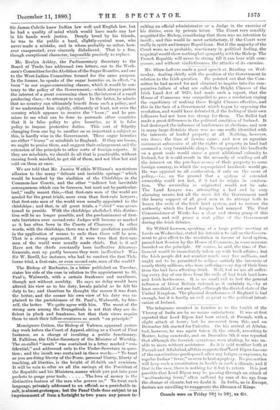We are told that Mr. Justice Watkin Williams's mysterious allusion
to the many "delicate and invisible springs" which would be touched by the abolition of the Chiefships in the Common-law Courts, and the other "indirect but inevitable -consequences which can be foreseen, but need not be particular- ised," really meant this,—that first-rate men of the world are needed for the great trials, more even than first-rate lawyers ; that first-rate men of the world were usually appointed to the chiefships ; and that, in all great trials, a " chief " was accus- tomed to preside. With the chiefships abolished, this distinc- tion will be no longer possible, and the predominance of first- rate barristers over second-rate Judges will become as marked as it has often been in the Courts of Chancery. In other words, with the chiefships, there was a finer gradation possible in the application of means to ends than there will be now. That is a strong argument, if it were true that first-rate men of the world were usually made chiefs. But is it so P Have not the chiefs constantly been ineffective Attorney. Generals, sent up partly because they were ineffective ? Was Sir W. Bevil], for instance, who had to conduct the first Tich- borne trial, a first-rate, or even second-rate, man of the world ?






































 Previous page
Previous page